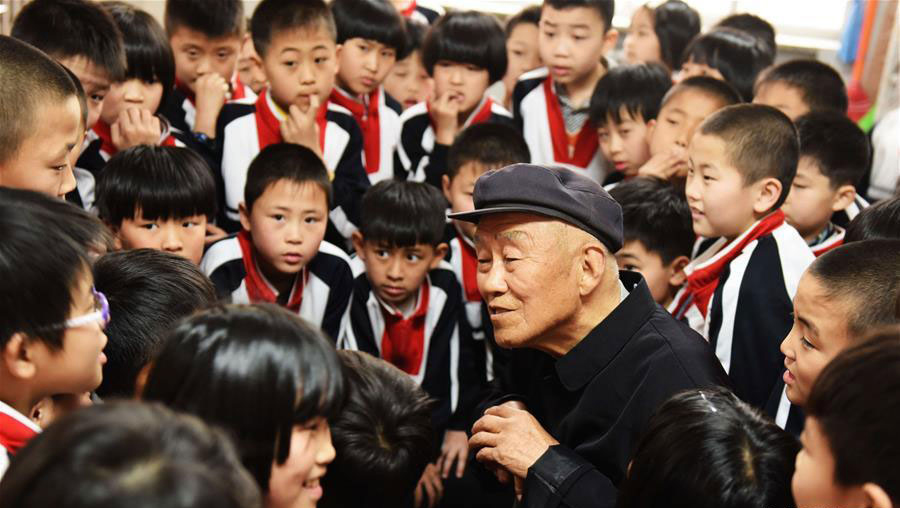Academics discuss national security education

A veteran educates students on national security at a school in Jizhou, North China's Hebei Province, on April 12.
On the occasion of the first National Security Education Day, which fell on April 15, scholars weighed in on the overall national security outlook that Chinese President Xi Jinping stressed in a speech that day.
Xi urged the country to comprehensively implement the National Security Law and educate the public to raise awareness on the subject.
Since the 18th CPC National Congress, the Central Committee with Xi Jinping as general secretary has made national security a priority and established a related commission.
On the first National Security Education Day, publicity and educational activities were held across the country. Scholars said that the overall national security outlook should be the focus of these activities.
Wang Hongwei, an associate professor from the School of Public Administration and Policy at Renmin University of China, said that national security education should focus on the meaning of “overall” in the term “overall national security outlook.” The word refers to the integrated and systematic nature of security issues, he added.
Security issues have become increasingly complex, and a variety of risks are linked, requiring systematic perspectives to address national security problems, Wang said.
Since 2012, the “Investigation Project Team for the Top 10 National Security Events” at the University of International Relations has unveiled the annual top 10 national security events for four years. Events like the commissioning of the Liaoning aircraft carrier and the sustained smog in Beijing, Tianjin and Hebei have been included in the list in past years.
Liu Yuejin, a professor from the University of International Relations, said that the content of national security education should not be confined to traditional concepts like counterintelligence.
It is particularly necessary to compensate for the deficiencies in non-traditional national security education and incorporate network security and environmental safety into the education system, Liu said, adding that non-traditional thinking is also required for educators.
In terms of those being educated, leading cadres, especially high-level cadres, should be the priorities, he added.
Academics said that the overall national security outlook calls for equal attention to the security of sovereignty and public safety.
Liu noted that the overall national security outlook proposed in 2014 and the National Security Law passed in 2015 both focus on public security.
In China, the masses should be regarded as the focal point of security policy, said Xu Xiaolin, dean of the College of Public Administration at the Huazhong University of Science and Technology. The people-oriented security concept incorporates all values in security governance, Xu said.
“China should build a national security system that integrates political, sovereignty, military, economic, cultural, social, technological, information, ecological, resource and nuclear security,” Wang said, adding that when adhering to the overall national security outlook, it is vital to place public security at the core.
Wang stressed that the regulation of many security issues requires not only the leadership and input of the government and professional functional departments but also the joint participation of the military, social organizations, enterprises and individuals, especially the broad masses, to prevent risks and solve problems.
A number of scholars have pointed out the weaknesses of Chinese research on national security, particularly the overall national security outlook. There is a lack of research institutions or theories on the subject, and the national security governance system is insufficient, they said.
Currently no Chinese university or research institute offers a national security degree or research program. Liu said this needs to change. He also suggested opening courses on national security education in Party schools and governance academies at all levels to educate political leaders.
Wide-ranging issues and tasks in national security necessitate not only macroscopic perspectives, but also concrete, targeted research to systematically organize and summarize up rules from within, scholars said.
Zhang Chunhai is a reporter at the Chinese Social Sciences Today.
